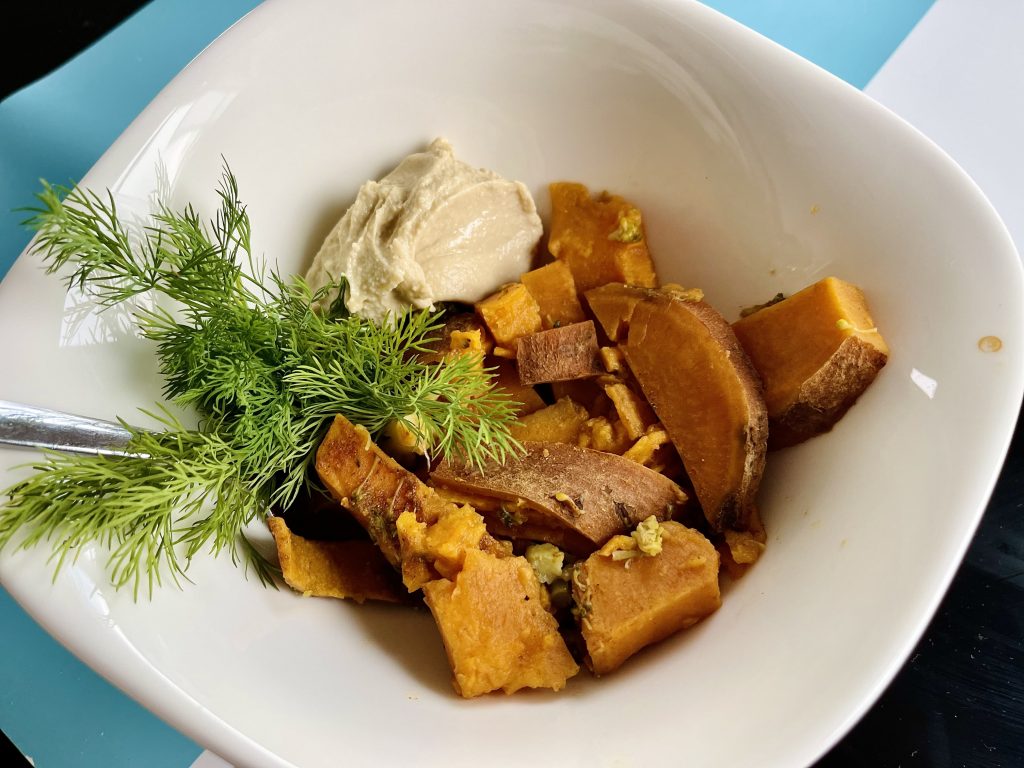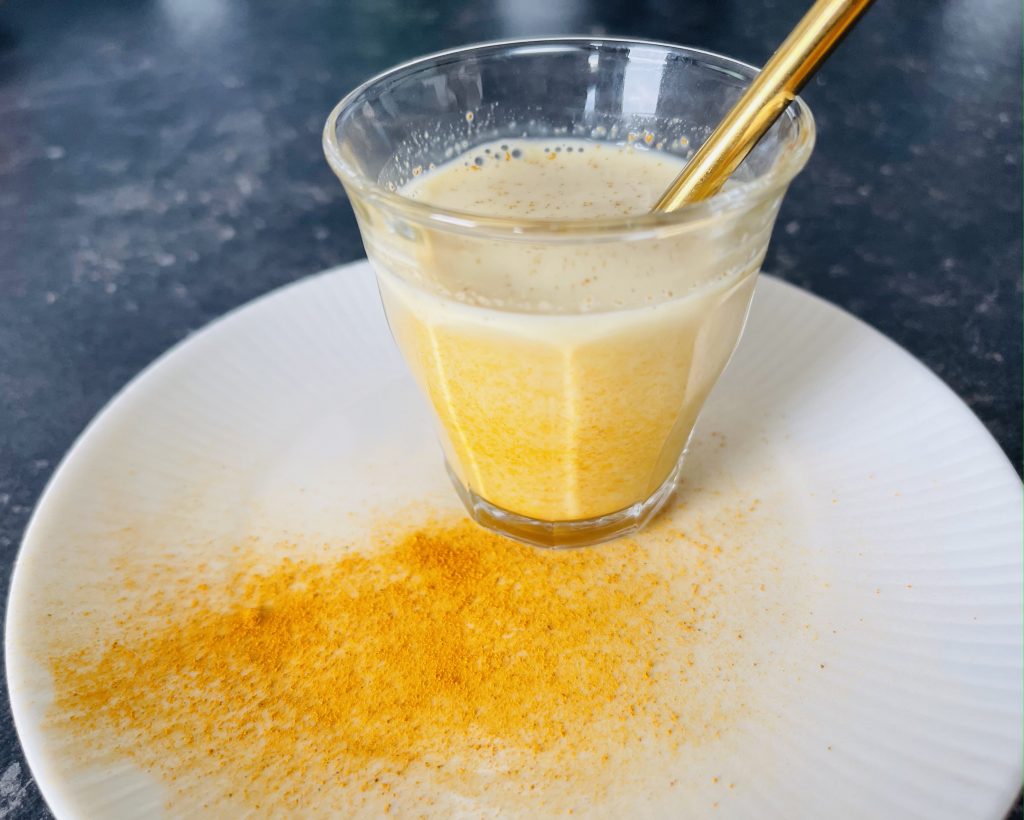Ayurveda has clear recommendations for diet during #pregnancy. Mother and child should eat really well. At the same time the mother must keep her #Doshas in balance and not burden the digestive system too much. It is most optimal when the food and preparations meet the individual needs of the mother regarding her constitution and current state of health and digestion power.
Do the tests and then follow the recommendations for an appropriate diet…
•#test what’s my current state of health
•#test what’s my current digestion power
EASY TO DIGEST DIET IN THE FIRST THREE MONTHS
The ayurvedic recommendations for nutrition take into account the pregnancy-related changes in the maternal body from the beginning. In the first three months, the hormonal changes dominate as an expression of increased Pitta. This can lead to increased nausea and, in extreme cases, to insatiable vomiting. This is especially true of mothers for whom Pitta is part of their constitution. But it also affects women in whom the Pitta energy was derailed before pregnancy due to their fiery diet and lifestyle. Therefore, mild and cooling food in small portions is advised. Follow the recommendations that you can find here at #ideal food for increased pitta.
Animal proteins sometimes are also necessary to ensure that the mother-to-be and her child get enough nutrients during pregnancy. If the digestive power allows it, milk and dairy products as well as meat, fish and eggs can be consumed during this time. The amount is based on the current digestive capacity, although several small servings are generally recommended. It is best for the expectant mother to keep a food diary and find out how large the portions can be without causing digestive problems such as gas, bloating, constipation or heartburn.
If there is a lack of iron, minced meat or broth of beef and lamb is recommended for pregnant women. Organic liver sausage is also a good source of iron. Those who absolutely do not like to eat meat can consume consommé or algae products made from Chlorella and Spirulina. An experienced holistic physician should definitely be consulted, because deficiency symptoms during pregnancy lead, among other things, to disturbed development of nerves and hinder the growth of the unborn child.
NOURISHING DIET FROM 4TH TO 7TH MONTH
During this time, the diet is geared towards the child’s development. All tissues and organs differentiate in this phase. Therefore, the mother’s food must be rich. It should also contain a lot of minerals and vitamins, for example from fresh herbs and raw vegetables and fruits. It should also contain all the essential amino acids and fatty acids that are necessary for the structure and maintenance of body tissues. During pregnancy, basic and mild diets are recommended and Pitta should be kept in check, which for hormonal reasons is prone to increase.
NOURISHING AND EASY TO DIGEST DIET IN THE FIRST LAST MONTHS
So the expectant mother can keep up health wise with the rapid growth of the child in the last three months and keep enough strength for the birth, her food should give her strength and energy. At the same time, she should make sure that her Vata remains in balance.
The Vata energy controls all movements and thus also the birth process. If the Vata is increased, it can lead to premature labor and sudden rotation of the child, which can lead to birth arrest or an unfavorable birth position. Therefore, the expectant mother should avoid anything that increases her Vata, especially if Vata predominates in her naturally.
That means no dry food or excessive amounts of meat and cereal products that can cause constipation. Otherwise, follow the recommendations for the #ideal diet for increased Vata. This means primarily warm and cooked food, which is preferably liquid, pulpy or pureed.
IDEAL FOOD AND EATING HABITS DURING PREGNANCY:
• eat slowly
• chew well
• eat in peace
• eat several small portions that do not fit in your own hands at the most
• eat the last meal from 7 pm onwards like soup, stew, porridge or cooked vegetables
• pure and clean
• fresh
• easy to digest
• nutritious
• well cooked
• soft, fluid and tend to be cooling in the first three months
• good looking
• mild (extremely spicy and sour are avoided)
• regular
• ghee
• seeds and kernels, especially sesame and chia seeds
• nuts such as almonds, hazelnuts, and cashews
• cooked porridge or pudding made from quinoa, amaranth, buckwheat, millet, rice flakes and oat flakes
• mild digestive spices such as pepper, ginger, cinnamon, paprika, pigment, turmeric, galangal, coriander, caraway, cumin, chervil, lovage, thyme, rosemary, basil, bar leek, mugwort, fenugreek seeds,savory, marjoram, oregano, sage, tarragon, dill, fennel, cardamom, anise, peppermint and lemon balm.
• a small amount of garlic, possibly also a little green chilli
• sweeteners such as raw cane sugar, coconut blossom sugar, maple and date syrup, agave and pear syrup
• oat-, rice- or almond milk
• little cow and goat milk
• dry fruits like raisins, figs and dates
• fresh, sweet ripe fruit or compote of apples (Gala/Red Delicious) pears, honeydew melon, mango, papaya, pomegranate, grapes, cherries, blueberries
• white rice, millet, quinoa, rice, glass, konjac and lentil noodles
• cooked vegetables such as fennel, zucchini, carrots, cauliflower, beetroot, sweet potatoes, pumpkin, broccoli
• ruccola and field and oak leaf salad
• stews and soups with lots of vegetables
• softboiled mung beans and red or yellow lentils
• one whole egg or 1 egg yolk per day
• chicken or beef broth
• eventually little meat such as chicken, turkey and sea fish
• teas such as fennel-anise-caraway tea, licorice root tea and herbal tea
FOOD TO AVOID DURING PREGNANCY:
• anything solid, hard, compact, and sticky
• what is made up of too many different ingredients
• what is combined like milk and dairy products with fruits, meat, fish and eggs
• grains like rye, wheat, and wheat flour products like bulgur, couscous and saitan
• hard or compact bread, rolls, cakes and biscuits, including those with cereal substitutes
• unripe hard fruit
• hydrogenated fats from palm oil or margarine
• processed sugar and sweets
• processed cakes and biscuits
• processed ready meals and fast food of all kind
Learn more:
#test what’s my current digestion power
Im Ayurveda gibt es klare Empfehlungen zur Ernährung in der Schwangerschaft. Mutter und Kind sollten sich richtig gut ernähren, gleichzeitig auch die Doshas im Gleichgewicht halten und das Verdauungssystem nicht zu sehr belasten. Am optimalsten ist es, wenn Nahrungsmittel und Zubereitungen den individuellen Bedürfnissen der Mutter entsprechen. Die unten aufgeführte Tests und Empfehlungen helfen bei der Auswahl der passenden Nahrungsmittel, Speisen und Getränke.
LEICHT VERDAULICHES IN DEN ERSTEN DREI SCHWANGERSCHAFTSMONATEN
Die ayurvedischen Empfehlungen zur Ernährung berücksichtigt von Anfang an die schwangerschaftsbedingten Veränderungen im mütterlichen Körper. In den ersten drei Monaten dominieren die hormonellen Veränderungen als Ausdruck von vermehrtem Pitta. Dabei kann es vermehrt zu Übelkeit und im Extremfall zu unstillbaren Erbrechen kommen. Das betrifft vor allem Mütter, bei denen das Pitta zur Konstitution gehört. Es trifft aber auch Frauen, bei denen die Pitta-Energie aufgrund ihrer feurigen Ernährung und Lebensweise bereits vor der Schwangerschaft entgleist war. Daher ist mildes und tendenziell kühlendes Essen in kleinen Portionen angesagt.
Damit die werdende Mutter und ihr Kind während der Schwangerschaft genügend Nährstoffe bekommen, sind auch tierische Proteine notwendig. Sofern es die Verdauungskraft zulässt, können in dieser Zeit Milch und Milchprodukte sowie Fleisch, Fisch und Eier eingenommen werden. Die Menge ergibt sich aus der aktuellen Verdauungskapazität, wobei im Allgemeinen mehrere kleine Portionen empfohlen werden. Am besten legt sich die werdende Mutter ein Nahrungsmitteltagebuch an und findet heraus, wie groß die Portionen sein dürfen, ohne dass es zu Verdauungsbeschwerden wie Blähungen, Völlegefühl, Verstopfungen oder Sodbrennen kommt.
Bei Eisenmangel wird Gehacktes oder Brühe von Rind- und Lammfleisch für Schwangere empfohlen. Die gute Leberwurst in Bioqualität ist auch eine gute Quelle für Eisen. Wer absolut kein Fleisch essen mag, kann Kraftbrühen zu sich nehmen oder Algenprodukte von Chlorella und Spirulina. Ein/e erfahrenene/er ganzheitlich orientierte/r Arzt/Ärztin sollte unbedingt hinzugezogen werden, denn Mangelerscheinung in der Schwangerschaft führen unter anderem zu einer gestörten Entwicklung von Nerven und behindern das Wachstum beim Ungeborenen.
NÄHRENDES IM 4TEN-7TEN SCHWANGERSCHAFTSMONAT
In dieser Zeit ist die Ernährung auf das Entwicklung des Kindes ausgerichtet. Alle Gewebe und Organe differenzieren sich in dieser Phase. Deswegen muss das Essen der Mutter reichhaltig sein. Es sollte auch viele Mineralien und Vitamine enthalten, zum Beispiel von frischen Kräutern und Rohkost von Gemüse und Obst. Weiterhin sollte es alle essentiellen Aminosäuren und Fettsäuren enthalten, die für den Aufbau und Erhalt unserer Gewebe notwendig sind. In der Schwangerschaft ist basische und milde Kost empfohlen und Pitta in Schach zu halten, das aus hormonellen Gründen gerne zu entgleisen droht.
NÄHRENDES UND LEICHT VERDAULICHES IN DEN ERSTEN DREI SCHWANGERSCHAFTSMONATEN
Damit die werdende Mutter gesundheitlich mit dem rasanten Wachstum des Kindes in den letzten drei Monaten mithalten kann und genügend Kraft für die Geburt behält, sollte ihr Essen Kraft und Energie spenden. Gleichzeitig sollte sie darauf achten, dass ihr Vata im Gleichgewicht bleibt.
Die Vata-Energie steuert alle Bewegungen und damit auch den Geburtsvorgang. Ist das Vata stark erhöht, kann es zu vorzeitigen Wehen und plötzlicher Kindsdrehung kommen, die zum Geburtsstillstand oder einer ungünstigen Beckenendlage führen kann. Deswegen sollte die werdende Mutter alles meiden, was ihr Vata erhöht, vor allem wenn bei ihr naturgemäß Vata vorherrscht.
Das bedeutet kein trockenes Essen oder zu große Fleischmenge und Getreideprodukte, die Verstopfung auslösen können. Ideal bei erhöhtem Vata ist in erster Linie warmes und gekochtes Essen, das vorzugsweise flüssig, breiig oder püriert ist.
IDEALE ERNÄHRUNG UND ERNÄHRUNGSWEISE WÄHREND DER SCHWANGERSCHAFT:
• langsam essen
• gut kauen
• in Ruhe essen
• mehrere kleine Portionen essen, die maximal in die beiden eigenen Hände passen
• die letzte Mahlzeit ab 19 Uhr nur noch Suppe, Eintopf, Brei oder gekochtes Gemüse essen
• rein und sauber sein
• frisch sein
• leicht verdaulich sein
• nahrhaft sein
• gut gekocht sein
• in den ersten drei Monaten weich, flüssiges und tendenziell kühlend sein
• auch süß sein
• mild sein, auf extrem Scharfes und Saures wird verzichtet
• regelmäßig sein
• Ghee
• Samen, Saaten und Kerne vor allem Sesam und Chiasamen
• Nüsse wie Mandeln, Haselnüsse und Cashewnüsse
• gekochter Brei oder Pudding aus Quinoa, Amaranth, Buchweizen, Hirse, Reisflocken und Haferflocken
• milde verdauungsfördernde Gewürze wie etwas Pfeffer, Ingwer, Zimt, Paprika, Pigment, Curcuma, Galgant, Koriander, Kümmel, Kreuzkümmel, Kerbel, Liebstöckel, Thymian, Rosmarin, Basilikum, Barlauch, Beifuß, Bockshornkleesamen, Bohnenkraut, Majoran, Oregano, Salbei, Estragon, Dill, Fenchel, Kardamon, Anis, Pfefferminze und Zitronenmelisse.
• Knoblauch in geringer Menge, evtl auch ganz wenig grünen Chili
• Süßungsmittel wie Rohrohrzucker, Kokosblütenzucker, Ahorn- und Dattelsirup, Agaven- und Birnendicksaft
• Hafer-, Reis- oder Mandelmilch
• wenig Kuh- und Ziegenmilch
• Trockenfrüchte wie Rosinen, Feigen und Datteln
• frisches süßes reifes Obst/Kompott von Apfel (Gala/Red Delicious) Birnen Honigmelone, Mango, Papaya, Granatapfel, Weintrauben, Kirschen, Blaubeeren
• weisser Reis, Hirse, Quinoa, Reis-, Glas-, Konjak- und Linsennudeln
• gekochtes Gemüse wie Fenchel, Zucchini, Möhren, Blumenkohl, Rote Beete, Süßkartoffeln, Kürbis, Brokkoli
• Ruccola und Feld- und Eichblattsalat
• Eintöpfe und Suppen mit viel Gemüse
• gekochte Mungbohnen und rote oder gelbe Linsen
• tgl 1 ganzes Ei bzw. 1 Eigelb
• Hühner- oder Rinderbrühe
• evtl. wenig Fleisch wie Huhn, Pute und Meeresfisch
•Tees wie Fenchel-Anis-Kümmel-Tee, Süßholzwurzeltee und Kräutertee
LEBENSMITTEL, DIE IN DER SCHWANGERSCHAFT BESSER GEMIEDEN WERDEN:
• Schwerverdauliches
• alles feste, harte, kompakte und klebrige
• was aus zu vielen verschiedenen Zutaten besteht
• was falsch kombiniert ist wie Milch und Milchprodukte mit Früchten, Fleisch, Fisch und Eiern
• Getreide wie Roggen, Weizen und Weizenmehlprodukte wie Bulgur, Couscous und Saitan
• in letzten drei Monaten hartes oder kompaktes Brot, Brötchen, Kuchen und Kekse
• unreifes hartes Obst
• gehärtete Fette aus Palmöl oder Margarine
• industriell verarbeiteter Zucker und Süßigkeiten
• industriell hergestellter Kuchen und Kekse
• Fertiggerichte und Fast Food jeder Art
Erfahre mehr:



